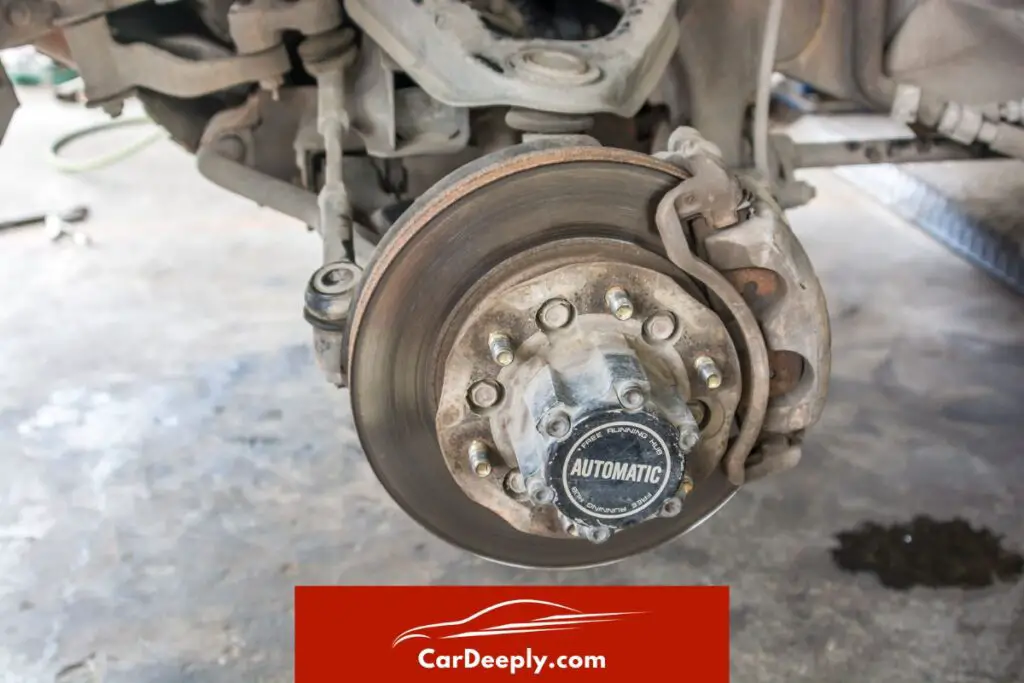Creaking noise when braking – it’s a sound that can make any driver’s heart sink. But don’t let it ruin your ride! This comprehensive guide will arm you with the knowledge to tackle this issue head-on.
You’ll discover:
- The common causes of brake creaking and how to identify them.
- Practical, step-by-step solutions to silence those annoying sounds.
- Tips on maintaining your brakes to prevent future creaking.
So, buckle up and get ready to dive into a world of automotive know-how that will keep your journey smooth and creak-free.
Let’s hit the road!
Advertising links are marked with *. We receive a small commission on sales, nothing changes for you.
Key Takeaways

- Creaking noise when braking is a warning sign of potential brake system issues.
- Causes range from damaged brake pads to less lubrication and sticking caliper pins.
- Regular maintenance and checks are crucial for preventing creaking noises.
- Investing in high-quality brake components can save money in the long run.
- Seek professional help if you need help with diagnosing or fixing brake problems.
What is Creaking Noise When Braking?
“Creaking noise when braking” – it’s a phrase that sends shivers down the spine of many drivers. But what exactly does it mean? Well, it’s a sound that your vehicle makes when you apply the brakes. It’s not the usual noise you’d expect, like the engine’s gentle hum or the indicators’ soft click. No, this is a creaking, groaning sound that seems to come from the very depths of your car. It’s a noise that says, “Hey, something’s not right here!”
Why Should You Care About Creaking Noise When Braking?
Now, you might be thinking, “So what? My car makes a funny noise. Big deal.”
But here’s the thing – that creaking noise is more than just an annoyance. It’s a warning sign. It’s your car’s way of telling you something is wrong with the braking system. And when it comes to your brakes, you don’t want to ignore any warning signs.
Here’s why:
- Safety: Brakes are one of your vehicle’s most critical safety systems. If they’re not working correctly, it could lead to accidents.
- Cost: Ignoring the problem now could lead to more significant, more expensive issues.
- Peace of mind: Knowing that your car is in good working order gives you peace of mind when you’re on the road.
So, if you hear a creaking noise when braking, don’t ignore it. Dive into this guide in the next chapter, arm yourself with knowledge, and prepare to tackle the issue head-on.
Your car (and your wallet) will thank you!
Unraveling the Causes of Creaking Noise When Braking
You understand the root cause of the creaking noise when braking is the first step toward solving the problem. Here, we delve into the most common culprits behind this unsettling sound.
Each case is accompanied by practical advice to help you effectively diagnose and address the issue.
Brake Pads are Broken or Damaged
One of the most common causes of creaking noise when braking is damaged or broken brake pads. These essential brake system components can wear down over time, leading to less effective braking and that dreaded creaking noise.
How to spot it: Look for uneven wear or cracks on the brake pads.
What to do: Replace the brake pads. It’s not a job for the faint-hearted, but it’s doable with the right tools and patience.
Use of Low-Quality Brake Pads or Brake Shoes
Not all brake pads are created equal. Low-quality brake pads or brake shoes can cause a creaking noise when braking. They might be cheaper upfront but could cost you more in the long run.
How to spot it: The noise is persistent, and the brake pads wear out quickly.
What to do: Invest in high-quality brake pads. They might cost a bit more but last longer and perform better.
Breaking Down of Brake Pads
Brake pads can break down over time, especially if not maintained properly. This can lead to a creaking noise when braking.
How to spot it: The brake pads are thin, reducing braking performance.
What to do: Regularly check and replace your brake pads. It’s a small price for peace of mind on the road.
Less Lubrication
Lubrication is vital for the smooth operation of your brake system. Without it, you might start to hear a creaking noise when braking.
How to spot it: The noise worsens over time, and the brakes feel rough when applied.
What to do: Apply high-temperature brake grease to the back of the brake pads and the contact points on the caliper.
Hard Elements Between Brake Pads and Rotor Cover or Rotor
Hard elements like stones or debris can sometimes get stuck between the brake pads and the rotor cover or rotor. This can cause a creaking noise when braking.
How to spot it: The noise is intermittent and changes when you apply the brakes.
What to do: Inspect the brake pads and rotor for any foreign objects and remove them.
Sticking Caliper Pins
Caliper pins allow your brake calipers to move freely. If they’re sticking, it can cause a creaking noise when braking.
How to spot it: The noise is consistent, and the brakes feel stiff when applied.
What to do: Regularly clean and lubricate the caliper pins to keep them moving freely.
Wheel Is Not Tightened Properly
If your wheel is not tightened properly, it can cause a creaking noise when braking.
How to spot it: The noise changes when you turn the wheel, and the car feels unstable.
What to do: Check the wheel nuts and tighten them if necessary.
Damaged Wheel Bearing
A damaged wheel bearing can cause a creaking noise when braking.
How to spot it: The noise gets louder when you turn the wheel, and the car feels unstable.
What to do: Replace the wheel bearing. It’s a complex job, so you might want a professional to do it.
The brake Rotor and Pads are not added.
If your brake rotor and pads are not bedded properly, it can cause a creaking noise when braking.
How to spot it: The noise is consistent, and the brakes feel less effective.
What to do: Bed in your brakes by applying them gently and then gradually increasing the pressure.
Warped Brake Disc
A warped brake disc can cause a creaking noise when braking.
How to spot it: The noise is consistent, and the car vibrates when brakes are applied.
What to do: Replace the brake disc. It’s a complex job, so you might want a professional to do it.
Spongy Brake Pedal Or Bad Brake Fluid
A spongy brake pedal or bad brake fluid can cause a creaking noise when braking.
How to spot it: The brake pedal feels soft, and the brakes are less responsive.
What to do: Bleed your brakes to remove any air in the system and replace the brake fluid.
Worn-out Brake Pads
Worn-out brake pads can cause a creaking noise when braking.
How to spot it: The brake pads are thin, reducing braking performance.
What to do: Replace the brake pads. It’s a simple job that can greatly impact your braking performance.
Damaged Upper and Lower Control Arm Bushings
Damaged upper and lower control arm bushings can cause a creaking noise when braking.
How to spot it: The noise changes when you turn the wheel, and the car feels unstable.
What to do: Replace the control arm bushings. It’s a complex job, so you might want a professional to do it.
Frequently Asked Questions
How often should I replace my brake pads to prevent creaking noise when braking?
The frequency of brake pad replacement can vary depending on your driving habits, the quality of the brake pads, and the type of vehicle. However, a general rule of thumb is to check them every 50,000 miles. It might be time for a replacement if you notice significant wear or hear a creaking noise when braking.
Can weather conditions cause a creaking noise when braking?
Yes, weather conditions can affect your brakes. Cold weather can cause brake rotors to contract, leading to a creaking noise when braking. Similarly, wet conditions can cause rust on the brake rotors, resulting in noise. Regular maintenance can help prevent these issues.
Is it safe to drive my car if it’s making a creaking noise when braking?
While a creaking noise when braking doesn’t necessarily mean your vehicle is unsafe to drive, it’s a sign that something might be wrong with your brake system. It’s best to get it checked out by a professional as soon as possible to ensure your safety on the road.
Can worn-out tires cause a creaking noise when braking?
While worn-out tires can cause various issues, they’re unlikely to cause a creaking noise when braking. This noise is typically related to the brake system, such as the brake pads, rotors, or caliper pins.
Can I prevent a creaking noise when braking?
Regular maintenance is the best way to prevent a creaking noise when braking. This includes regularly checking your brake system, using high-quality brake pads, and seeking professional help. You can ensure a smooth and quiet ride by taking care of your vehicle.
Conclusion: Importance of Regular Maintenance and Checks
We’ve covered a lot of ground in this guide, from understanding what a creaking noise when braking is to explore the common causes and their solutions. But if there’s one key takeaway, it’s this: regular maintenance and checks are crucial.
Keeping your vehicle in top shape isn’t just about preventing creaking noises when braking. It’s about ensuring your safety and the safety of others on the road. It’s about avoiding costly repairs down the line. And it’s about enjoying a smooth, worry-free ride every time you hit the road.
Here are three key steps to keep in mind:
- Regular checks: Make it a habit to inspect your brake system regularly. Look for signs of wear and tear, and address any issues promptly.
- Quality parts: Invest in high-quality brake pads and other components. They might cost a bit more upfront but they’ll save you money in the long run.
- Professional help: Don’t hesitate to seek professional assistance if you need clarification. It’s better to be safe than sorry.
Remember, your vehicle is a complex machine. Every part has a role, and every detail needs to be in good working order for the engine to function properly. So, don’t ignore that creaking noise when braking. Take action, solve the problem, and enjoy the peace of mind of knowing your vehicle is in good hands.
And remember, the journey doesn’t end here. Keep learning, keep exploring, and keep driving safely.

Sebastian loves convertibles and drove a BMW 335i for a long time (325 hp is just a dream). Today, with two children, he is more concerned with SUVs and family-friendly vehicles. In addition to an Audi A4 Avant, he also drives a Cupra Formentor VZ – even as a family man, you can’t do without speed. Get to know Sebastian better and visit the About Us page.
Advertising links are marked with *. We receive a small commission on sales, nothing changes for you.
